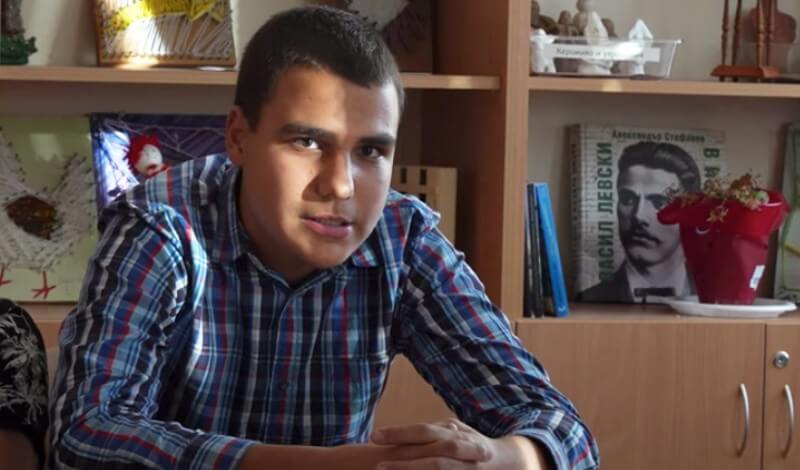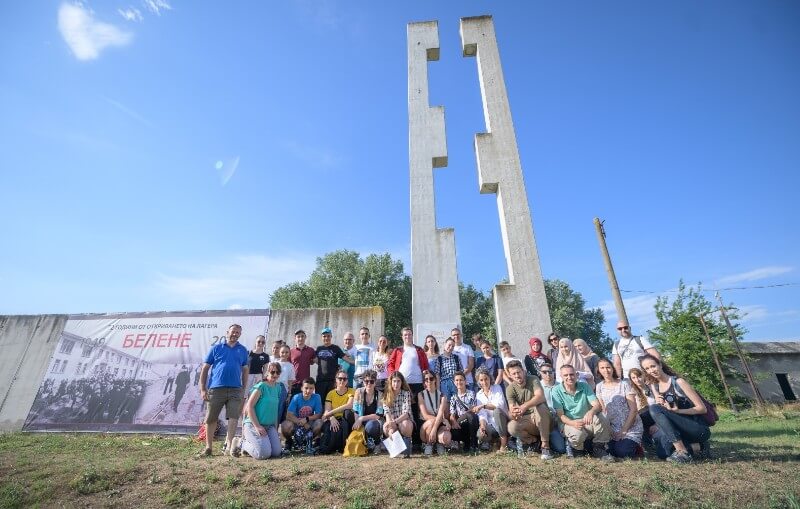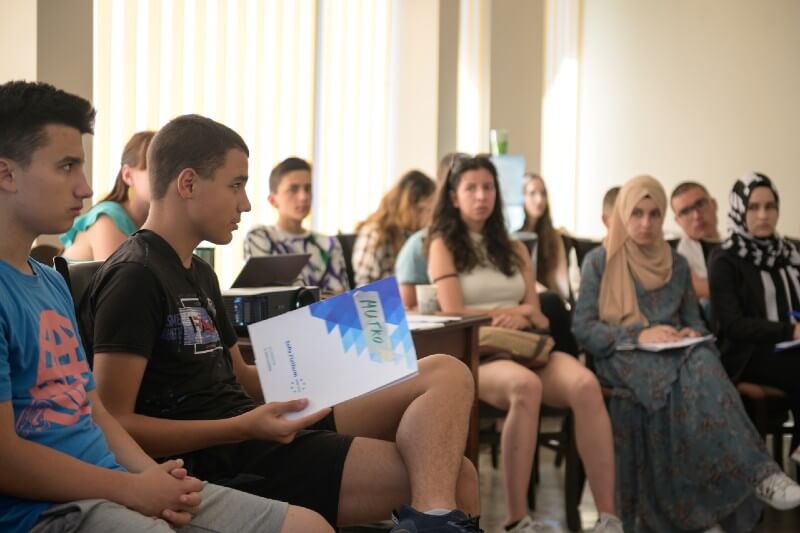
Early in the school year, 16-year-old Dimitar Metodiev sent a poll out to fellow students from his Sofia high school. It asked: “What do you know about communism?” and “How do you know we live in a democracy?”
The answers he received affirmed his impression that his peers were not particularly interested either in the recent past or in their democratic present.
Dimitar would like to change that. He is convinced that knowledge of history is key to a more successful future, and that awareness of our rights and obligations makes us stronger.
For the purpose, he enlisted help from teachers and fellow students and started an awareness campaign featuring public presentations, a photo exhibition, and a story broadcast by the school TV station. Dimitar’s presentations were enriched with personal impressions from his participation in Sofia Platform’s summer school for memory and democracy “Why should we remember?” in Belene earlier this year. There he met communist-era concentration camp survivors and debated with peers the recent past’s importance for the present and future of Bulgaria.
For next semester Dimitar is planning several additional presentations and public discussions as well as a school trip to Belene, the site of the longest-running camp for political prisoners in Bulgaria.
Dimitar’s interest in history and the role of youth in democratic processes isn’t merely academic — he is an active participant in them. He is a member of his school’s student government, which is involved in institutional decision-making and problem-solving, as well as of the Sofia Student Council, an organization that introduces young people to the principles of parliamentarism.
Dimitar talked to us about what motivates a young person’s interest in socially significant topics and in civic engagement.
America for Bulgaria Foundation: Тhis past summer you were a participant in the annual summer school on memory and democracy in Belene run by Sofia Platform. Which of the summer school themes encouraged you to apply?
Dimitar Metodiev: I have been interested in history for a long time, especially in the history of our most recent past, because people who do not know their past cannot make the best of their future. This is one of the purposes of me studying history.
ABF: You are seeking lessons for the future in the past? What lessons from history would be useful to young people today, do you think?
D.M.: We always have to look to history so as not to repeat past mistakes. If we repeat them, we will doom our children and grandchildren to repeating them as well.

We were born at a time when we have freedom of speech, freedom of thought, we have the right to speak freely about the subjects that interest us, and if we allow what occurred from 1944 to 1989 to happen again, we will lose everything we were born with, and people will no longer be equal. We simply must not let history repeat itself.
This is what Mrs. Dzhermanova and Mr. Vutev told us during our meetings with them as well [he is referring to Belene and Slanchev bryag concentration camp survivors Tsvetana Dzhermanova and Kolyo Vutev, ed.]: “You are engaged, young, smart. Don’t let what happened to us happen again.”
ABF: What takeaways from the summer school stand out the most for you?
D.M.: I learned a lot about concentration camps in Bulgaria that I didn’t know before. I was astounded by the things I found out — for example, that the Belene camp was officially closed in the 1950s, but that, in reality, it worked until the end of the 1980s.
I always thought I was the only one interested in these topics. At the summer school, I met 20-plus other like-minded young people who have the same interests, are inquisitive, aware… It’s then I realized that Bulgaria does have a future — as long as we young people are allowed to get involved in civic education.
In addition to the history and personal accounts, I took away some human things — for example, that age is just a number. Mrs. Dzhermanova and Mr. Vutev impressed me with their energy; they come to the summer school every year despite their advanced age! [Tsvetana Dzhermanova is 94 years old, and Kolyo Vutev is 82, ed.]
ABF: You mentioned civic education. What civic education themes do you find most relevant and appealing, and why?
D.M.: One of the most interesting subjects to me is the role of students and schools in a democratic society. This topic concerns the ways in which we young people can help a society become more democratic.
Another subject is the rights and obligations of students. Most people do not know their rights or their obligations. Many of my classmates have told me about different situations they have been in, and I have always told them, “You have the right to take this or that kind of action.” I always try to help, to be involved.

I would like to become a teacher, and at university I plan to pursue history and pedagogy. That’s one option. The alternative is pursuing sociology or political science.
ABF: Your interest in democratic citizenship is not just academic. You are a member of the student government at your school and of the Sofia Student Council, as well as of several clubs. What motivates you to be so involved?
D.M.: I want to be useful to as many people as possible. I like that there are people who have learned about their rights from me, others have learned about history, and still others have been inspired to become more engaged.
I get involved because I know how important student self-government is. There are many things we as students can do to prepare for what lies ahead.
ABF: What prompted you to become more active, and what would you say to your peers to encourage them to be more involved — be it at school, in their residential complex, or in their neighborhood?
D.M.: Knowing your rights and obligations gives you independence and power. If you don’t know what your rights are, you won’t know who to complain to if something goes wrong.
Things didn’t happen overnight for me — I became more involved gradually. I realized that when I am active, I am strong. I can express my opinion on many issues. Many people do not understand this. They don’t understand that when you are active, your opinion will be heard by many more people.
Sofia Platform runs the annual summer school on memory and democracy in Belene with support from the America for Bulgaria Foundation. Here you can see a short video from this year’s edition: https://www.youtube.com/watch?v=OUpAwuatykk&ab_channel=SofiaPlatform

